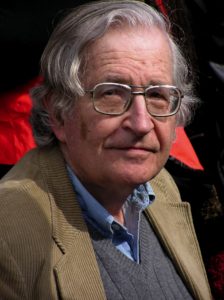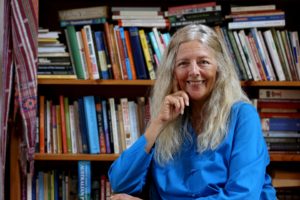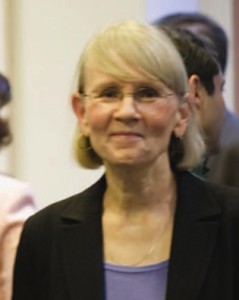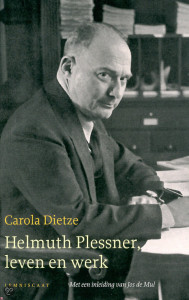Trump In The White House: An Interview With Noam Chomsky
On November 8, 2016, Donald Trump managed to pull the biggest upset in US politics by tapping successfully into the anger of white voters and appealing to the lowest inclinations of people in a manner that would have probably impressed Nazi propagandist Joseph Goebbels himself.
But what exactly does Trump’s victory mean, and what can one expect from this megalomaniac when he takes over the reins of power on January 20, 2017? What is Trump’s political ideology, if any, and is “Trumpism” a movement? Will US foreign policy be any different under a Trump administration?
Some years ago, public intellectual Noam Chomsky warned that the political climate in the US was ripe for the rise of an authoritarian figure. Now, he shares his thoughts on the aftermath of this election, the moribund state of the US political system and why Trump is a real threat to the world and the planet in general.
C.J. Polychroniou for Truthout: Noam, the unthinkable has happened: In contrast to all forecasts, Donald Trump scored a decisive victory over Hillary Clinton, and the man that Michael Moore described as a “wretched, ignorant, dangerous part-time clown and full-time sociopath” will be the next president of the United States. In your view, what were the deciding factors that led American voters to produce the biggest upset in the history of US politics?
Noam Chomsky: Before turning to this question, I think it is important to spend a few moments pondering just what happened on November 8, a date that might turn out to be one of the most important in human history, depending on how we react.
No exaggeration.
The most important news of November 8 was barely noted, a fact of some significance in itself.
On November 8, the World Meteorological Organization (WMO) delivered a report at the international conference on climate change in Morocco (COP22) which was called in order to carry forward the Paris agreement of COP21. The WMO reported that the past five years were the hottest on record. It reported rising sea levels, soon to increase as a result of the unexpectedly rapid melting of polar ice, most ominously the huge Antarctic glaciers. Already, Arctic sea ice over the past five years is 28 percent below the average of the previous 29 years, not only raising sea levels, but also reducing the cooling effect of polar ice reflection of solar rays, thereby accelerating the grim effects of global warming. The WMO reported further that temperatures are approaching dangerously close to the goal established by COP21, along with other dire reports and forecasts.
Another event took place on November 8, which also may turn out to be of unusual historical significance for reasons that, once again, were barely noted.
On November 8, the most powerful country in world history, which will set its stamp on what comes next, had an election. The outcome placed total control of the government — executive, Congress, the Supreme Court — in the hands of the Republican Party, which has become the most dangerous organization in world history.
Apart from the last phrase, all of this is uncontroversial. The last phrase may seem outlandish, even outrageous. But is it? The facts suggest otherwise. The Party is dedicated to racing as rapidly as possible to destruction of organized human life. There is no historical precedent for such a stand.
Is this an exaggeration? Consider what we have just been witnessing.
During the Republican primaries, every candidate denied that what is happening is happening — with the exception of the sensible moderates, like Jeb Bush, who said it’s all uncertain, but we don’t have to do anything because we’re producing more natural gas, thanks to fracking. Or John Kasich, who agreed that global warming is taking place, but added that “we are going to burn [coal] in Ohio and we are not going to apologize for it.”
The winning candidate, now the president-elect, calls for rapid increase in use of fossil fuels, including coal; dismantling of regulations; rejection of help to developing countries that are seeking to move to sustainable energy; and in general, racing to the cliff as fast as possible.
Trump has already taken steps to dismantle the Environmental Protection Agency (EPA) by placing in charge of the EPA transition a notorious (and proud) climate change denier, Myron Ebell. Trump’s top adviser on energy, billionaire oil executive Harold Hamm, announced his expectations, which were predictable: dismantling regulations, tax cuts for the industry (and the wealthy and corporate sector generally), more fossil fuel production, lifting Obama’s temporary block on the Dakota Access pipeline. The market reacted quickly. Shares in energy corporations boomed, including the world’s largest coal miner, Peabody Energy, which had filed for bankruptcy, but after Trump’s victory, registered a 50 percent gain.
The effects of Republican denialism had already been felt. There had been hopes that the COP21 Paris agreement would lead to a verifiable treaty, but any such thoughts were abandoned because the Republican Congress would not accept any binding commitments, so what emerged was a voluntary agreement, evidently much weaker.
Effects may soon become even more vividly apparent than they already are. In Bangladesh alone, tens of millions are expected to have to flee from low-lying plains in coming years because of sea level rise and more severe weather, creating a migrant crisis that will make today’s pale in significance. With considerable justice, Bangladesh’s leading climate scientist says that “These migrants should have the right to move to the countries from which all these greenhouse gases are coming. Millions should be able to go to the United States.” And to the other rich countries that have grown wealthy while bringing about a new geological era, the Anthropocene, marked by radical human transformation of the environment. These catastrophic consequences can only increase, not just in Bangladesh, but in all of South Asia as temperatures, already intolerable for the poor, inexorably rise and the Himalayan glaciers melt, threatening the entire water supply. Already in India, some 300 million people are reported to lack adequate drinking water. And the effects will reach far beyond.
It is hard to find words to capture the fact that humans are facing the most important question in their history — whether organized human life will survive in anything like the form we know — and are answering it by accelerating the race to disaster.
Similar observations hold for the other huge issue concerning human survival: the threat of nuclear destruction, which has been looming over our heads for 70 years and is now increasing.
It is no less difficult to find words to capture the utterly astonishing fact that in all of the massive coverage of the electoral extravaganza, none of this receives more than passing mention. At least I am at a loss to find appropriate words.
Turning finally to the question raised, to be precise, it appears that Clinton received a slight majority of the vote. The apparent decisive victory has to do with curious features of American politics: among other factors, the Electoral College residue of the founding of the country as an alliance of separate states; the winner-take-all system in each state; the arrangement of congressional districts (sometimes by gerrymandering) to provide greater weight to rural votes (in past elections, and probably this one too, Democrats have had a comfortable margin of victory in the popular vote for the House, but hold a minority of seats); the very high rate of abstention (usually close to half in presidential elections, this one included). Of some significance for the future is the fact that in the age 18-25 range, Clinton won handily, and Sanders had an even higher level of support. How much this matters depends on what kind of future humanity will face.
According to current information, Trump broke all records in the support he received from white voters, working class and lower middle class, particularly in the $50,000 to $90,000 income range, rural and suburban, primarily those without college education. These groups share the anger throughout the West at the centrist establishment, revealed as well in the unanticipated Brexit vote and the collapse of centrist parties in continental Europe. [Many of] the angry and disaffected are victims of the neoliberal policies of the past generation, the policies described in congressional testimony by Fed chair Alan Greenspan — “St. Alan,” as he was called reverentially by the economics profession and other admirers until the miraculous economy he was supervising crashed in 2007-2008, threatening to bring the whole world economy down with it. As Greenspan explained during his glory days, his successes in economic management were based substantially on “growing worker insecurity.” Intimidated working people would not ask for higher wages, benefits and security, but would be satisfied with the stagnating wages and reduced benefits that signal a healthy economy by neoliberal standards.
Working people, who have been the subjects of these experiments in economic theory, are not particularly happy about the outcome. They are not, for example, overjoyed at the fact that in 2007, at the peak of the neoliberal miracle, real wages for nonsupervisory workers were lower than they had been years earlier, or that real wages for male workers are about at 1960s levels while spectacular gains have gone to the pockets of a very few at the top, disproportionately a fraction of 1%. Not the result of market forces, achievement or merit, but rather of definite policy decisions, matters reviewed carefully by economist Dean Baker in recently published work.
The fate of the minimum wage illustrates what has been happening. Through the periods of high and egalitarian growth in the ’50s and ’60s, the minimum wage — which sets a floor for other wages — tracked productivity. That ended with the onset of neoliberal doctrine. Since then, the minimum wage has stagnated (in real value). Had it continued as before, it would probably be close to $20 per hour. Today, it is considered a political revolution to raise it to $15.
With all the talk of near-full employment today, labor force participation remains below the earlier norm. And for working people, there is a great difference between a steady job in manufacturing with union wages and benefits, as in earlier years, and a temporary job with little security in some service profession. Apart from wages, benefits and security, there is a loss of dignity, of hope for the future, of a sense that this is a world in which I belong and play a worthwhile role.
The impact is captured well in Arlie Hochschild’s sensitive and illuminating portrayal of a Trump stronghold in Louisiana, where she lived and worked for many years. She uses the image of a line in which residents are standing, expecting to move forward steadily as they work hard and keep to all the conventional values. But their position in the line has stalled. Ahead of them, they see people leaping forward, but that does not cause much distress, because it is “the American way” for (alleged) merit to be rewarded. What does cause real distress is what is happening behind them. They believe that “undeserving people” who do not “follow the rules” are being moved in front of them by federal government programs they erroneously see as designed to benefit African-Americans, immigrants and others they often regard with contempt. All of this is exacerbated by [Ronald] Reagan’s racist fabrications about “welfare queens” (by implication Black) stealing white people’s hard-earned money and other fantasies.
Sometimes failure to explain, itself a form of contempt, plays a role in fostering hatred of government. I once met a house painter in Boston who had turned bitterly against the “evil” government after a Washington bureaucrat who knew nothing about painting organized a meeting of painting contractors to inform them that they could no longer use lead paint — “the only kind that works” — as they all knew, but the suit didn’t understand. That destroyed his small business, compelling him to paint houses on his own with substandard stuff forced on him by government elites.
Sometimes there are also some real reasons for these attitudes toward government bureaucracies. Hochschild describes a man whose family and friends are suffering bitterly from the lethal effects of chemical pollution but who despises the government and the “liberal elites,” because for him, the EPA means some ignorant guy who tells him he can’t fish, but does nothing about the chemical plants.
These are just samples of the real lives of Trump supporters, who are led to believe that Trump will do something to remedy their plight, though the merest look at his fiscal and other proposals demonstrates the opposite — posing a task for activists who hope to fend off the worst and to advance desperately needed changes.
Exit polls reveal that the passionate support for Trump was inspired primarily by the belief that he represented change, while Clinton was perceived as the candidate who would perpetuate their distress. The “change” that Trump is likely to bring will be harmful or worse, but it is understandable that the consequences are not clear to isolated people in an atomized society lacking the kinds of associations (like unions) that can educate and organize. That is a crucial difference between today’s despair and the generally hopeful attitudes of many working people under much greater economic duress during the Great Depression of the 1930s.
There are other factors in Trump’s success. Comparative studies show that doctrines of white supremacy have had an even more powerful grip on American culture than in South Africa, and it’s no secret that the white population is declining. In a decade or two, whites are projected to be a minority of the work force, and not too much later, a minority of the population. The traditional conservative culture is also perceived as under attack by the successes of identity politics, regarded as the province of elites who have only contempt for the ”hard-working, patriotic, church-going [white] Americans with real family values” who see their familiar country as disappearing before their eyes.
One of the difficulties in raising public concern over the very severe threats of global warming is that 40 percent of the US population does not see why it is a problem, since Christ is returning in a few decades. About the same percentage believe that the world was created a few thousand years ago. If science conflicts with the Bible, so much the worse for science. It would be hard to find an analogue in other societies.
The Democratic Party abandoned any real concern for working people by the 1970s, and they have therefore been drawn to the ranks of their bitter class enemies, who at least pretend to speak their language — Reagan’s folksy style of making little jokes while eating jelly beans, George W. Bush’s carefully cultivated image of a regular guy you could meet in a bar who loved to cut brush on the ranch in 100-degree heat and his probably faked mispronunciations (it’s unlikely that he talked like that at Yale), and now Trump, who gives voice to people with legitimate grievances — people who have lost not just jobs, but also a sense of personal self-worth — and who rails against the government that they perceive as having undermined their lives (not without reason).
One of the great achievements of the doctrinal system has been to divert anger from the corporate sector to the government that implements the programs that the corporate sector designs, such as the highly protectionist corporate/investor rights agreements that are uniformly mis-described as “free trade agreements” in the media and commentary. With all its flaws, the government is, to some extent, under popular influence and control, unlike the corporate sector. It is highly advantageous for the business world to foster hatred for pointy-headed government bureaucrats and to drive out of people’s minds the subversive idea that the government might become an instrument of popular will, a government of, by and for the people.
Is Trump representing a new movement in American politics, or was the outcome of this election primarily a rejection of Hillary Clinton by voters who hate the Clintons and are fed-up with “politics as usual?”
It’s by no means new. Both political parties have moved to the right during the neoliberal period. Today’s New Democrats are pretty much what used to be called “moderate Republicans.” The “political revolution” that Bernie Sanders called for, rightly, would not have greatly surprised Dwight Eisenhower. The Republicans have moved so far toward a dedication to the wealthy and the corporate sector that they cannot hope to get votes on their actual programs, and have turned to mobilizing sectors of the population that have always been there, but not as an organized coalitional political force: evangelicals, nativists, racists and the victims of the forms of globalization designed to set working people around the world in competition with one another while protecting the privileged and undermining the legal and other measures that provided working people with some protection, and with ways to influence decision-making in the closely linked public and private sectors, notably with effective labor unions.
The consequences have been evident in recent Republican primaries. Every candidate that has emerged from the base — such as [Michele] Bachmann, [Herman] Cain or [Rick] Santorum — has been so extreme that the Republican establishment had to use its ample resources to beat them down. The difference in 2016 is that the establishment failed, much to its chagrin, as we have seen.
Deservedly or not, Clinton represented the policies that were feared and hated, while Trump was seen as the symbol of “change” — change of what kind requires a careful look at his actual proposals, something largely missing in what reached the public. The campaign itself was remarkable in its avoidance of issues, and media commentary generally complied, keeping to the concept that true “objectivity” means reporting accurately what is “within the beltway,” but not venturing beyond.
Trump said following the outcome of the election that he “will represent all Americans.” How is he going to do that when the nation is so divided and he has already expressed deep hatred for many groups in the United States, including women and minorities? Do you see any resemblance between Brexit and Donald Trump’s victory?
There are definite similarities to Brexit, and also to the rise of the ultranationalist far-right parties in Europe — whose leaders were quick to congratulate Trump on his victory, perceiving him as one of their own: [Nigel] Farage, [Marine] Le Pen, [Viktor] Orban and others like them. And these developments are quite frightening. A look at the polls in Austria and Germany — Austria and Germany — cannot fail to evoke unpleasant memories for those familiar with the 1930s, even more so for those who watched directly, as I did as a child. I can still recall listening to Hitler’s speeches, not understanding the words, though the tone and audience reaction were chilling enough. The first article that I remember writing was in February 1939, after the fall of Barcelona, on the seemingly inexorable spread of the fascist plague. And by strange coincidence, it was from Barcelona that my wife and I watched the results of the 2016 US presidential election unfold.
As to how Trump will handle what he has brought forth — not created, but brought forth — we cannot say. Perhaps his most striking characteristic is unpredictability. A lot will depend on the reactions of those appalled by his performance and the visions he has projected, such as they are.
Trump has no identifiable political ideology guiding his stance on economic, social and political issues, yet there are clear authoritarian tendencies in his behavior. Therefore, do you find any validity behind the claims that Trump may represent the emergence of “fascism with a friendly face?” in the United States?
For many years, I have been writing and speaking about the danger of the rise of an honest and charismatic ideologue in the United States, someone who could exploit the fear and anger that has long been boiling in much of the society, and who could direct it away from the actual agents of malaise to vulnerable targets. That could indeed lead to what sociologist Bertram Gross called “friendly fascism” in a perceptive study 35 years ago. But that requires an honest ideologue, a Hitler type, not someone whose only detectable ideology is Me. The dangers, however, have been real for many years, perhaps even more so in the light of the forces that Trump has unleashed.
With the Republicans in the White House, but also controlling both houses and the future shape of the Supreme Court, what will the US look like for at least the next four years?
A good deal depends on his appointments and circle of advisers. Early indications are unattractive, to put it mildly.
The Supreme Court will be in the hands of reactionaries for many years, with predictable consequences. If Trump follows through on his Paul Ryan-style fiscal programs, there will be huge benefits for the very rich — estimated by the Tax Policy Center as a tax cut of over 14 percent for the top 0.1 percent and a substantial cut more generally at the upper end of the income scale, but with virtually no tax relief for others, who will also face major new burdens. The respected economics correspondent of the Financial Times, Martin Wolf, writes that, “The tax proposals would shower huge benefits on already rich Americans such as Mr Trump,” while leaving others in the lurch, including, of course, his constituency. The immediate reaction of the business world reveals that Big Pharma, Wall Street, the military industry, energy industries and other such wonderful institutions expect a very bright future.
One positive development might be the infrastructure program that Trump has promised while (along with much reporting and commentary) concealing the fact that it is essentially the Obama stimulus program that would have been of great benefit to the economy and to the society generally, but was killed by the Republican Congress on the pretext that it would explode the deficit. While that charge was spurious at the time, given the very low interest rates, it holds in spades for Trump’s program, now accompanied by radical tax cuts for the rich and corporate sector and increased Pentagon spending.
There is, however, an escape, provided by Dick Cheney when he explained to Bush’s Treasury Secretary Paul O’Neill that “Reagan proved that deficits don’t matter” — meaning deficits that we Republicans create in order to gain popular support, leaving it to someone else, preferably Democrats, to somehow clean up the mess. The technique might work, for a while at least.
There are also many questions about foreign policy consequences, mostly unanswered.
There is mutual admiration between Trump and Putin. How likely is it therefore that we may see a new era in US-Russia relations?
One hopeful prospect is that there might be reduction of the very dangerous and mounting tensions at the Russian border: note “the Russian border,” not the Mexican border. Thereby lies a tale that we cannot go into here. It is also possible that Europe might distance itself from Trump’s America, as already suggested by [German] Chancellor [Angela] Merkel and other European leaders — and from the British voice of American power, after Brexit. That might possibly lead to European efforts to defuse the tensions, and perhaps even efforts to move towards something like Mikhail Gorbachev’s vision of an integrated Eurasian security system without military alliances, rejected by the US in favor of NATO expansion, a vision revived recently by Putin, whether seriously or not, we do not know, since the gesture was dismissed.
Is US foreign policy under a Trump administration likely to be more or less militaristic than what we have seen under the Obama administration, or even the George W. Bush administration?
I don’t think one can answer with any confidence. Trump is too unpredictable. There are too many open questions. What we can say is that popular mobilization and activism, properly organized and conducted, can make a large difference.
And we should bear in mind that the stakes are very large.
Copyright, Truthout. May not be reprinted without permission.






